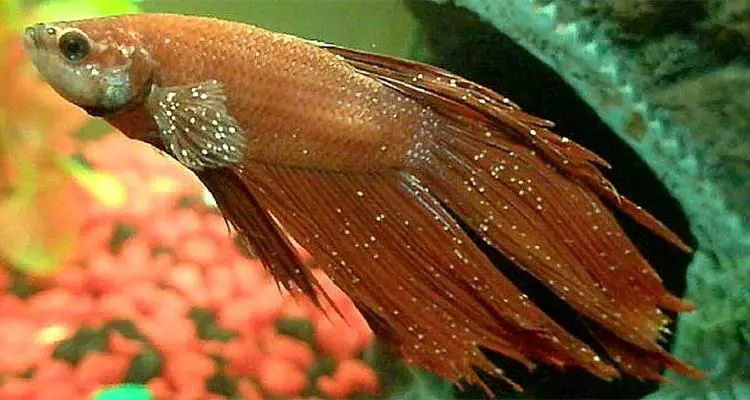Originally posted on May 5, 2023 @ 5:44 pm
Last Updated on 6 months by admin
Betta fish, also known as Siamese fighting fish, are a popular choice among pet owners due to their vibrant colors and unique personalities. However, these beautiful creatures are not immune to health issues, including the appearance of white spots on their bodies.
Identifying and treating white spots on betta fish can be a challenge, but with the right knowledge and tools, it is possible to help your beloved fish recover. In this article, we will explore the causes of white spots on betta fish, how to identify them, and the most effective treatment options available. So, let’s dive in and learn more about how to care for your betta fish!

Identifying and Treating Betta Fish with White Spots
Betta fish, also known as Siamese fighting fish, are popular pets due to their beautiful colors and unique personalities. However, just like any other fish, betta fish may develop health problems, including white spots on their body. These white spots can be caused by various factors, including parasites, bacterial infections, and fungal infections. In this article, we will discuss how to identify and treat betta fish with white spots.
Identifying Betta Fish with White Spots
The first step in treating betta fish with white spots is to identify the symptoms. White spots on the body of a betta fish can be caused by several factors, including ich, fungal infections, and bacterial infections.
Ich, also known as white spot disease, is a parasitic infection that causes small white spots to appear on the body and fins of the fish. These spots may look like grains of salt and can be accompanied by other symptoms, such as lethargy and loss of appetite.
Fungal infections can also cause white spots on the body of betta fish. These infections are caused by a fungus that can grow on the fish’s body, fins, and gills. Symptoms of fungal infections include white or gray patches on the body and fins, as well as frayed fins and tail.
Lastly, bacterial infections can cause white spots on the body of betta fish. These infections are caused by harmful bacteria that can enter the fish’s body through wounds or stress. Symptoms of bacterial infections include white spots on the body, as well as red streaks or patches on the fins and body.
If you notice any of these symptoms in your betta fish, it is important to take action immediately and start the treatment process.
Treating Betta Fish with White Spots
The treatment for betta fish with white spots will depend on the underlying cause of the problem. Here are some common treatments for each cause:
– Ich: Treatments for ich include raising the water temperature to 86°F, adding aquarium salt, and using medication specifically designed to treat ich. You may also need to do frequent water changes to keep the tank clean.
– Fungal infections: Treatments for fungal infections include using antifungal medication, raising the water temperature to 80°F, and doing frequent water changes to keep the tank clean.
– Bacterial infections: Treatments for bacterial infections include using antibiotics, doing frequent water changes, and improving the water quality in the tank. It’s also important to make sure your betta fish is not under any unnecessary stress.
It is important to follow the instructions on any medication you use and to continue the treatment for the recommended amount of time. You should also remove any uneaten food or waste from the tank regularly to prevent further infections.
Benefits of Treating Betta Fish with White Spots
Treating betta fish with white spots is important for their overall health and well-being. If left untreated, white spots can spread and cause further damage to the fish’s body. Additionally, betta fish with white spots may feel uncomfortable and stressed, which can lead to a weakened immune system and further health problems.
By identifying and treating white spots on your betta fish, you can help them stay healthy and happy. Keeping your tank clean and providing your betta fish with a stress-free environment can also help prevent future infections.
Conclusion
In conclusion, betta fish with white spots can be caused by various factors, including parasites, fungal infections, and bacterial infections. It is important to identify the symptoms and start the treatment process as soon as possible to prevent further damage to the fish’s body. By following the proper treatment methods and keeping your tank clean, you can help your betta fish stay healthy and happy.
Frequently Asked Questions
Here are some common questions and answers about identifying and treating betta fish with white spots:
What are the common causes of white spots on betta fish?
White spots on betta fish are often a sign of a parasitic infection, specifically ich or white spot disease. This is caused by a protozoan parasite that attaches itself to the fish’s skin, fins, and gills. Stress, poor water quality, and temperature fluctuations can weaken the fish’s immune system and make it more susceptible to this type of infection.
If left untreated, ich can be fatal to betta fish. It’s important to act quickly if you notice any white spots on your fish.
How can I treat my betta fish for white spots?
The most effective treatment for betta fish with white spots is a medication that contains malachite green or formalin. These medications can be found at most pet stores or online retailers that specialize in fish care. Follow the instructions on the label carefully, as too much medication can harm your fish.
It’s also important to maintain good water quality and keep the tank clean while your fish is being treated. This can help prevent the infection from spreading and speed up the healing process.
What should I do if my betta fish is not responding to treatment?
If your betta fish is not responding to treatment for white spots, it’s possible that the medication you’re using is not effective for the type of parasite your fish has. In this case, you may need to switch to a different medication.
It’s also possible that the infection has progressed too far for the medication to be effective. If your fish is not showing signs of improvement after a few days of treatment, consult a veterinarian who specializes in fish care.
Can white spots on betta fish be prevented?
While it’s not always possible to prevent betta fish from getting white spots, there are some steps you can take to reduce the risk of infection. Keep your betta fish tank clean and well-maintained, and avoid overcrowding the tank with too many fish. Make sure the water temperature and pH levels are appropriate for betta fish, and avoid sudden fluctuations in these levels.
It’s also a good idea to quarantine new fish for a few days before adding them to a tank with other fish. This can help prevent the spread of any potential infections.
What are some other signs of illness in betta fish?
In addition to white spots, there are several other signs of illness to watch for in betta fish. These include lethargy, loss of appetite, fin rot, and abnormal swimming behavior. If you notice any of these symptoms, it’s important to take action quickly to prevent the illness from worsening.
Regular observation and maintenance of your betta fish tank can help you catch any potential health issues early on.

How to Treat Ich on my Betta fish
In conclusion, identifying and treating betta fish with white spots is crucial to maintaining their health and well-being. As a pet owner, it is important to observe your betta fish regularly and look out for any unusual behavior or changes in their appearance.
If you notice white spots on your betta fish, it could be a sign of a fungal or bacterial infection. It is best to seek advice from a veterinarian or experienced fish keeper to determine the appropriate treatment.
Remember to regularly clean your betta fish’s tank and maintain proper water conditions to prevent illnesses. By providing a clean and healthy environment for your betta fish, you can help ensure they live a happy and long life.
